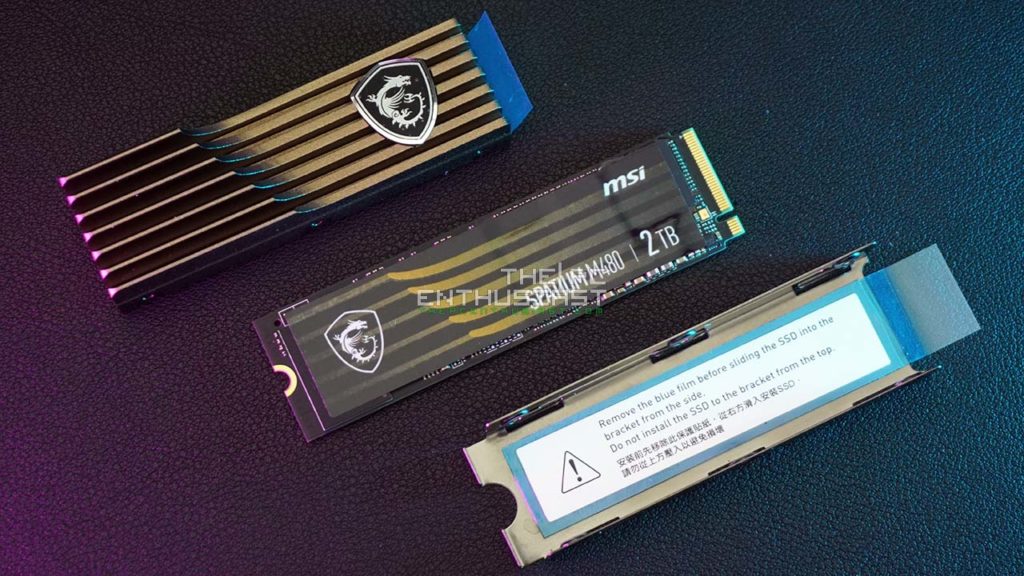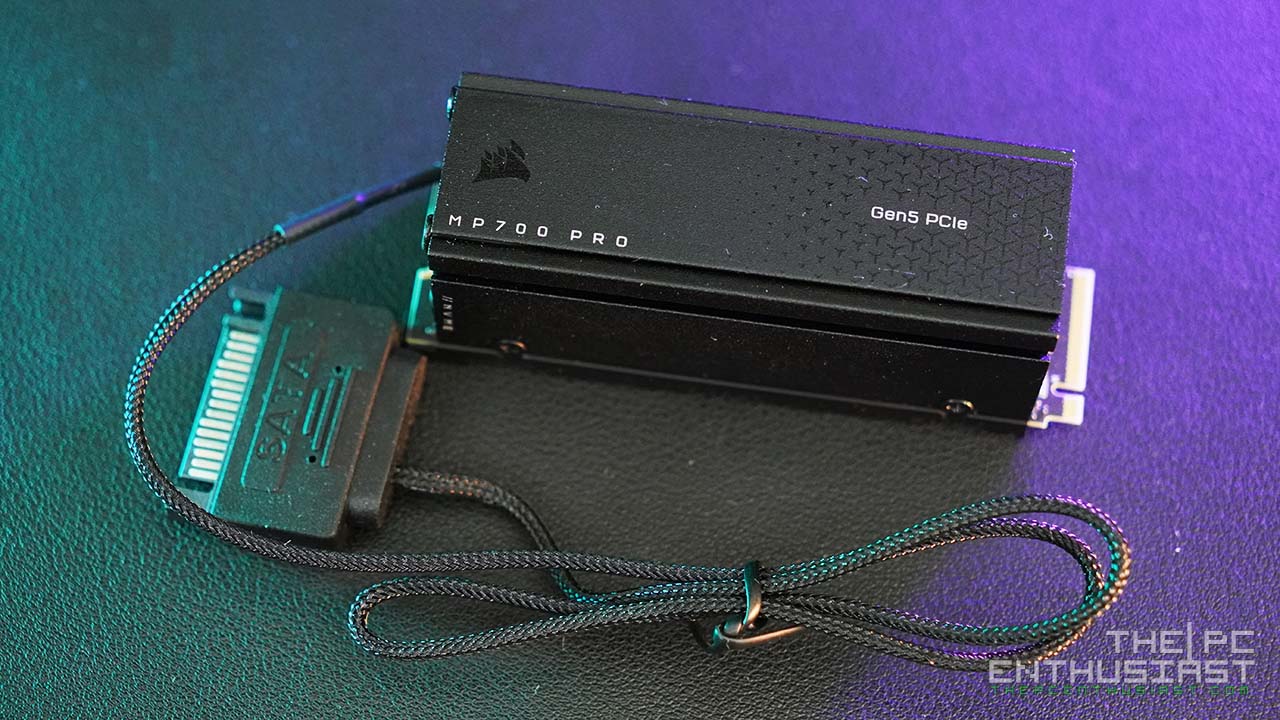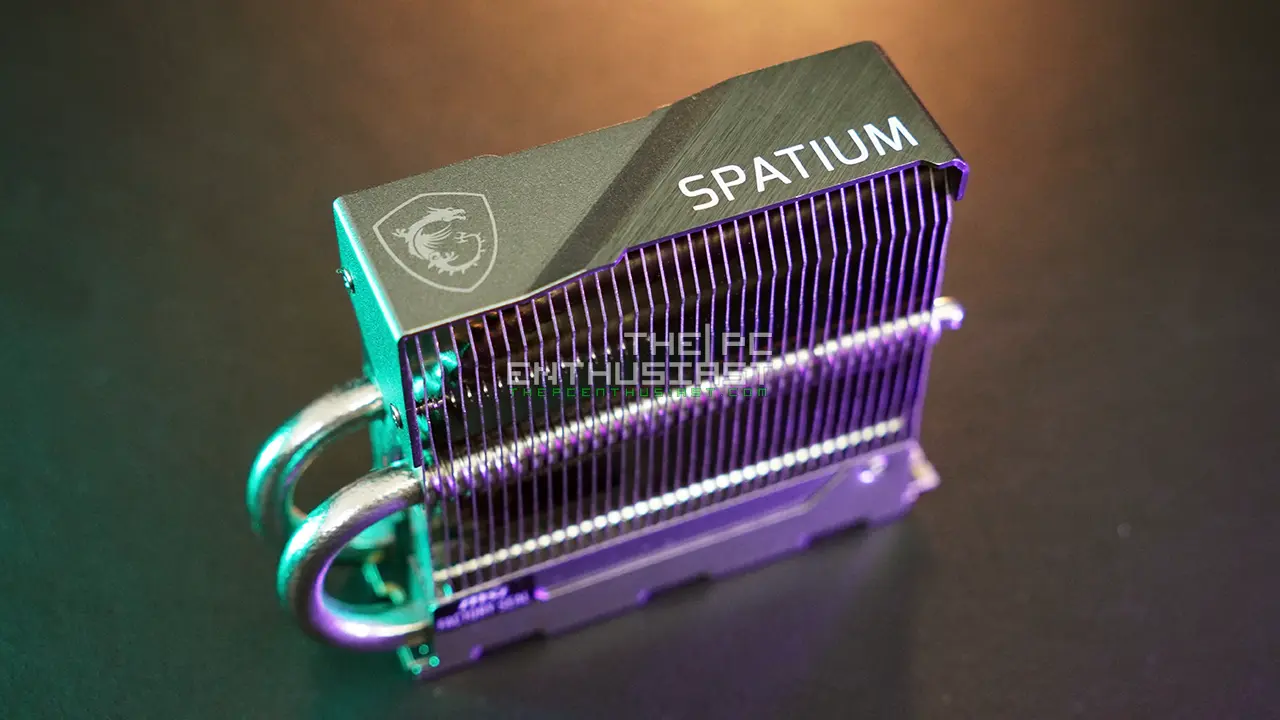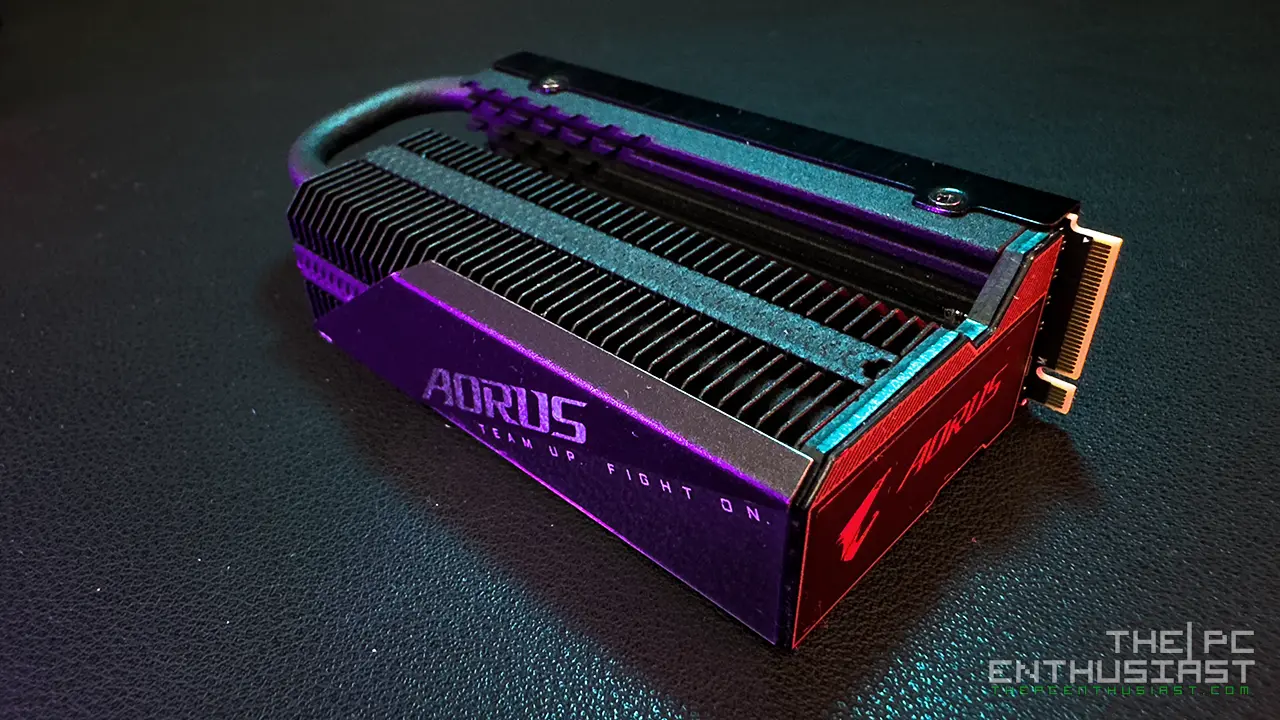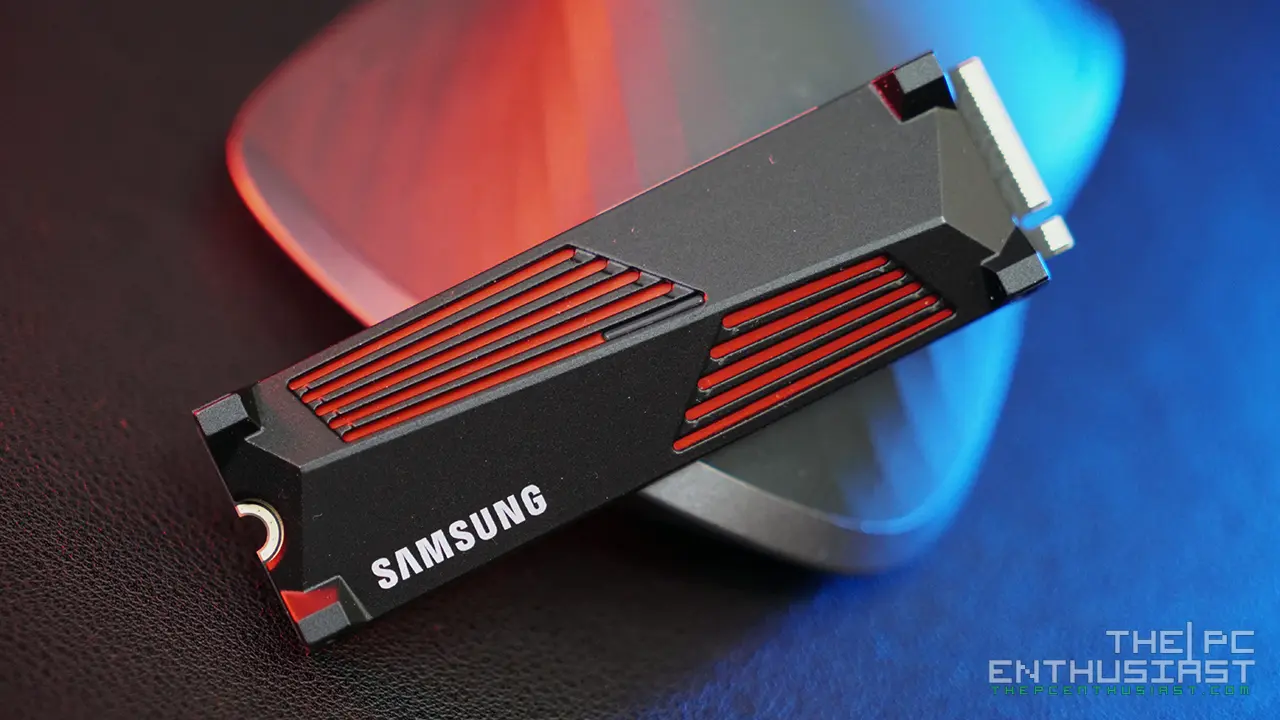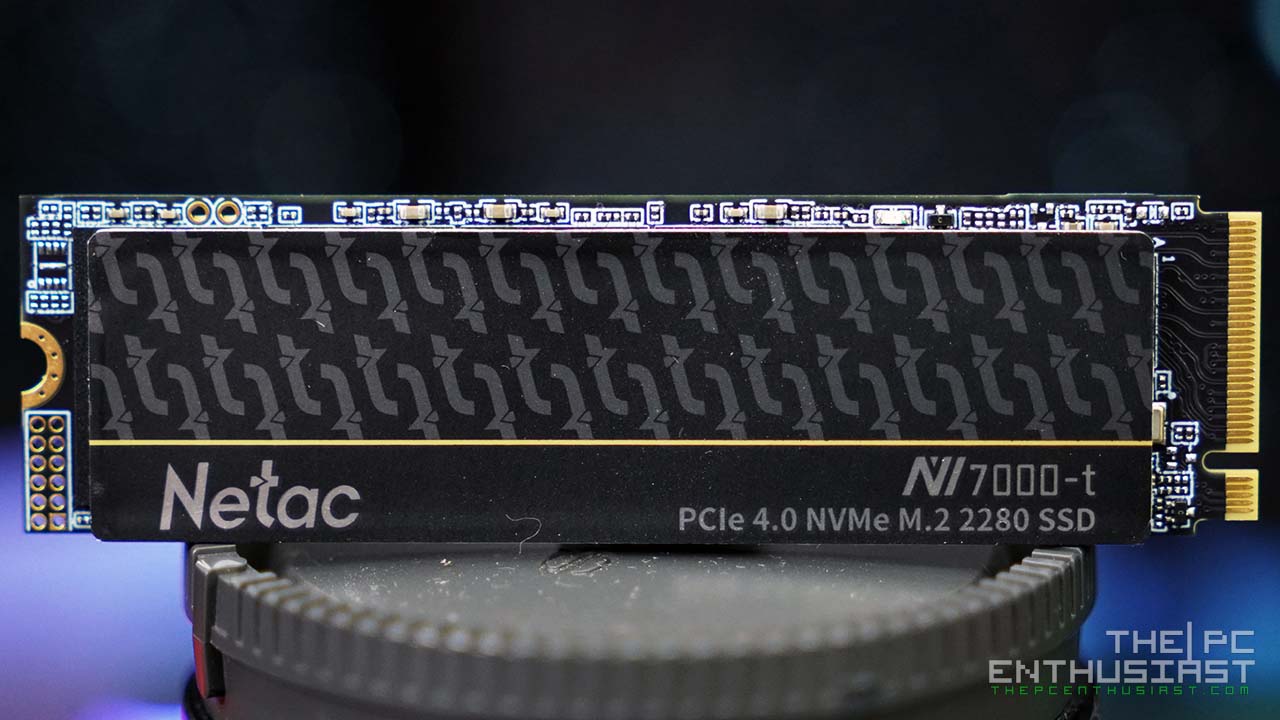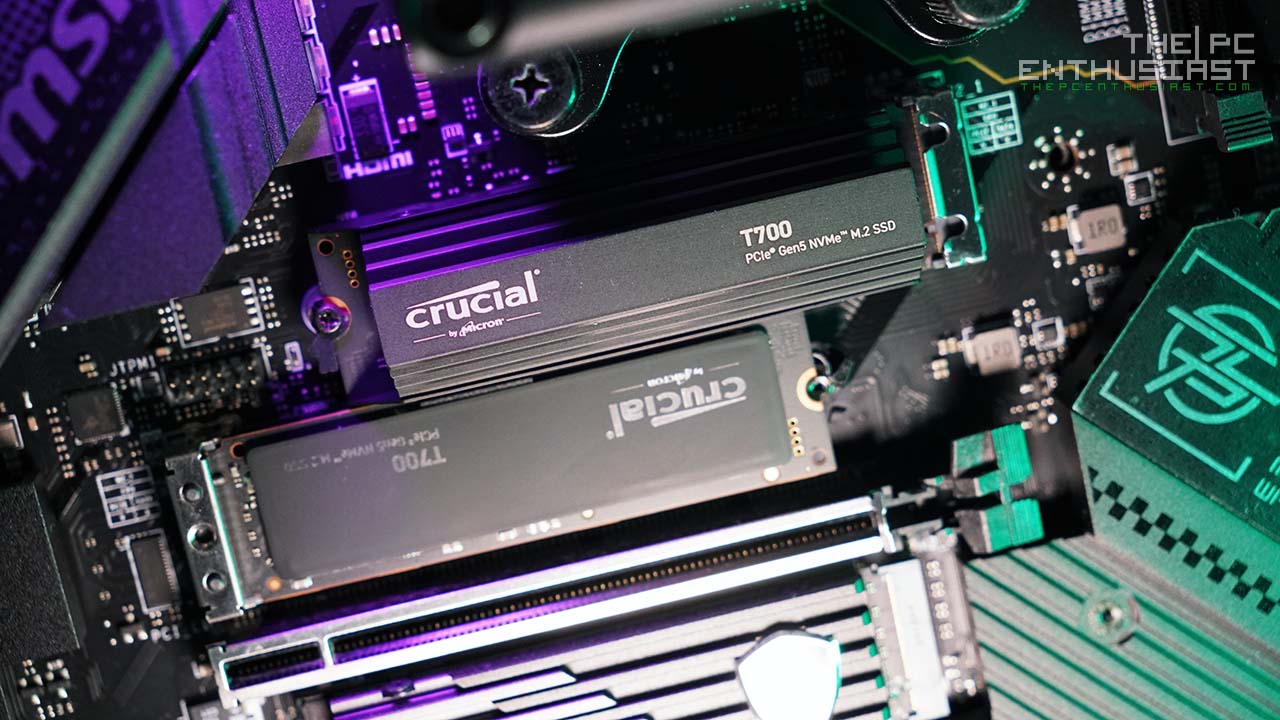MSI has finally entered the Gen4 NVMe SSD market, and today we are reviewing the new MSI Spatium M480 Gen4 NVMe SSD. We have the 2TB capacity here and this one is the “with heatsink” variant. Powered with a Phison E18 controller, the MSI Spatium M480 is currently the company’s fastest SSD. This isn’t the first Phison E18-powered SSD we have tested. So, let’s check out how it compares with the other E18-powered SSDs and other Gen4 NVMe SSDs as well. If you’re in the market for a fast M.2 SSD, please continue reading our MSI Spatium M480 review below.
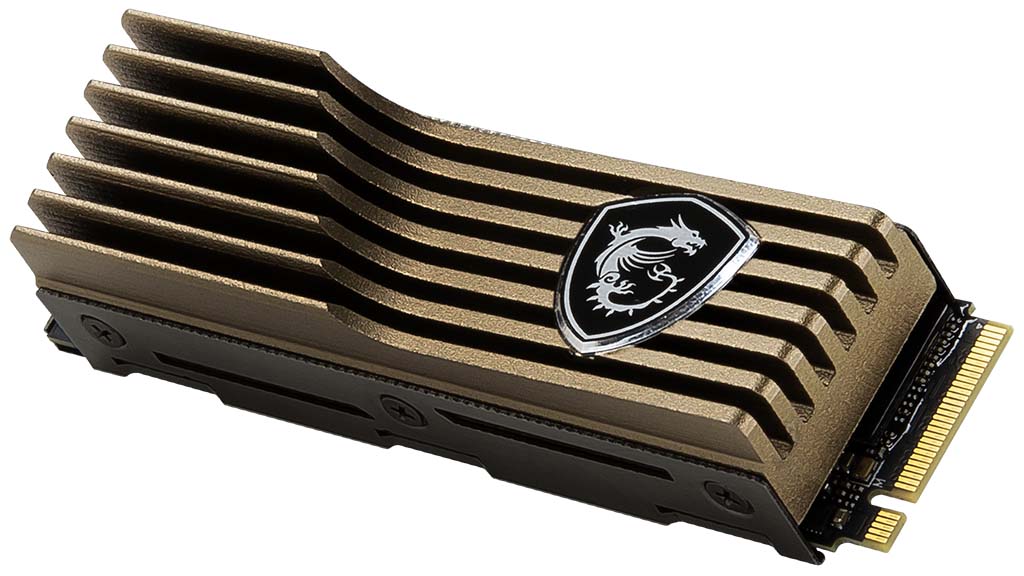
MSI Spatium M480 M.2 SSD Review – 2TB Capacity
MSI entered the Gen4 NVMe SSD market with a bang. And they went with a Phison PS5018-E18 paired with Micron’s 96L 3D TLC NAND flash as the main components of its new Spatium M480 Gen4 NVMe SSDs. The Spatium M480, although the design and name are unique, the core components are not actually. It is similar to Gigabyte’s AORUS Gen4 7000s, Sabrent’s Rocket 4 Plus, and a few others. These Gen4 NVMe SSDs are powered with the same Phison E18 controller.
Currently, the E18 is one of the options used in 2nd generation Gen4 NVMe SSDs. The other controller is from InnoGrit while the rest are in-house controllers. According to Phison, their E18 is “the only solution on the market” to break the 7GB/s barrier for both read and write access with superior power efficiency. The new controller is about 2.1x faster compared to PCIe Gen3x4 and about 1.5x faster compared to its predecessor, the E16.
Thanks to these components, MSI’s Spatium M480 is capable of reaching sequential speeds of up to 7,000MB/s read and up to 6,800MB/s write. Again, I don’t recommend the 500GB capacity with these Gen4 SSDs since they typically have slower write speeds.
More Features
There are two variants of the MSI Spatium M480. What we have here is the “with heatsink” variant. There is also a “without heatsink” variant. Both are similar but the without heatsink is slightly cheaper. There is nothing special with the heatsink, except MSI’s choice of color and stylish design. But it is a must that you use a heatsink with these Gen4 NVMe SSDs since they tend to run (very) hot.
MSI’s Spatium M480 is PCIe 4.0×4 and NVMe 1.4 compliant. It is also built-in with data security and error-correction features. Other features include TRIM, SMART, LDPC, End to End Data Path Protection, APST, and hardware encryption.
Since this SSD is based on the PCIe Gen4x4 interface, you do need a motherboard and processor that supports PCIe Gen4. For example, AMD’s Ryzen 3000 to 5000 processors and X570 or B550 motherboards. For Intel, it must be at least an 11th Gen Core i5 processor and a Z590 motherboard.
Gen4 NVMe SSDs, like the Spatium M480, are usually backward compatible with the PCIe 3.0 interface, but their speed will be limited to Gen3 speeds. That’s around 3,000MB/s of sequential read and write speeds. There’s no point in buying a Gen4 SSDs if you’re only going to bottleneck its speed.
Below are the rest of the specifications of the MSI Spatium M480 and after that let’s take a look at the product itself.
MSI Spatium M480 Specifications
| 500GB | 1TB | 2TB | |
|---|---|---|---|
| Form Factor | M.2 2280 | M.2 2280 | M.2 2280 |
| Interface | PCI-Express 4.0 x4, NVMe 1.4 | PCI-Express 4.0 x4, NVMe 1.4 | PCI-Express 4.0 x4, NVMe 1.4 |
| Controller | Phison PS5018-E18 | Phison PS5018-E18 | Phison PS5018-E18 |
| NAND | Micron 96L 3D TLC NAND Flash | Micron 96L 3D TLC NAND Flash | Micron 96L 3D TLC NAND Flash |
| DRAM Cache | DDR4 512MB | DDR4 1GB | DDR4 2GB |
| Sequential Read speed | Up to 6500 MB/s | Up to 7000 MB/s | Up to 7000 MB/s |
| Sequential Write speed | Up to 2850 MB/s | Up to 5500 MB/s | Up to 6800 MB/s |
| Random Read IOPS | up to 170k | up to 350k | up to 650k |
| Random Write IOPS | up to 600k | up to 700k | up to 700k |
| Max Operating Power | 6W | 6.6W | 8.2W |
| Idle Power PS3 | 10mW | 14mW | 22mW |
| Low Power L1.2 | 3mW | 3mW | 3mW |
| Operating Temperature | 0~70° Celsius | 0~70° Celsius | 0~70° Celsius |
| Storage Temperature | -40~85° Celsius | -40~85° Celsius | -40~85° Celsius |
| Terabytes Written | 350 TB | 700 TB | 1400 TB |
| MTBF | up to 1.6M Hours | up to 1.6M Hours | up to 1.6M Hours |
| Warranty | Limited 5-years or 350TBW | Limited 5-years or 700TBW | Limited 5-years or 1400TBW |
| Advanced Features | TRIM (Performance Optimization, OS support required) SMART (Self-Monitoring, Analysis and Reporting Technology) LDPC (Low Density Parity Check) ECC Algorithm End to End Data Path Protection APST (Autonomous Power State Transition) AES256/TCG OPAL2.0/Pyrite (Encryption, Data Security) |
||
Packaging and Closer Look
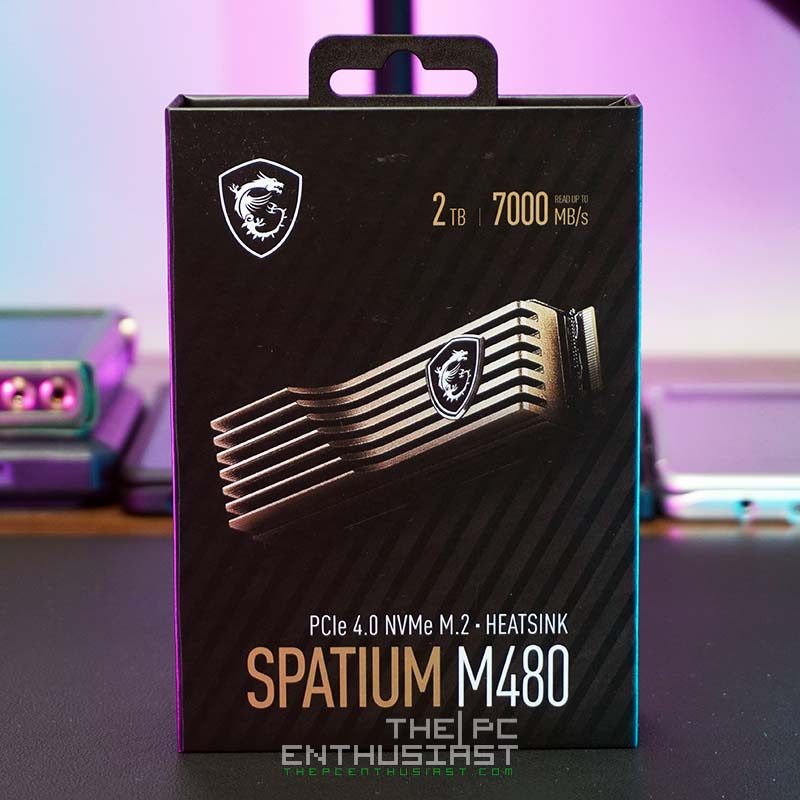
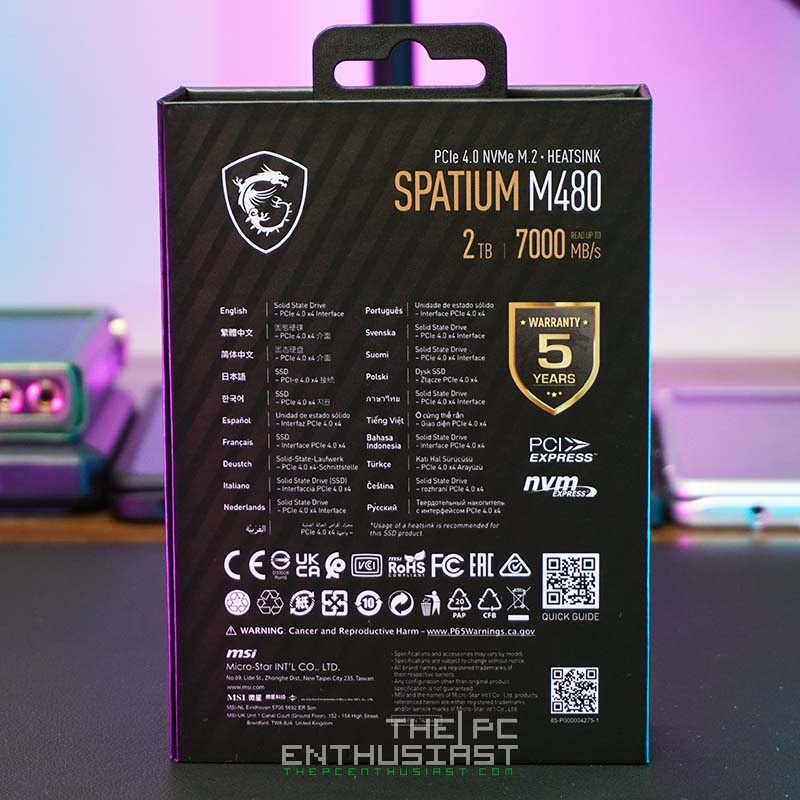
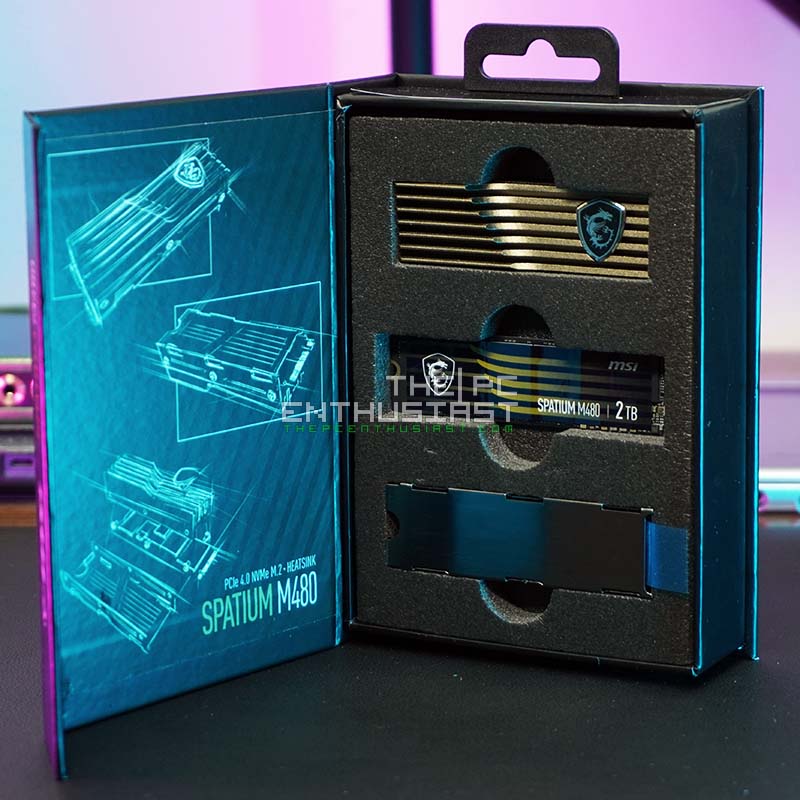
The Spatium M480 came with a small box with a flip cover. I think the box art is nice and very presentable. You can see a picture of the product at the front portion, including its speed and capacity. At the back is additional information about the drive. Opening the flip cover reveals the M480 SSD and the heatsink parts.
Included in the box are six screws, the bottom plate, the thick heatsink, and the M480 SSD itself. When I tested the drive, I did remove the sticker on top for better heat transfer. Be sure to remove the protective film covering the thermal pads.
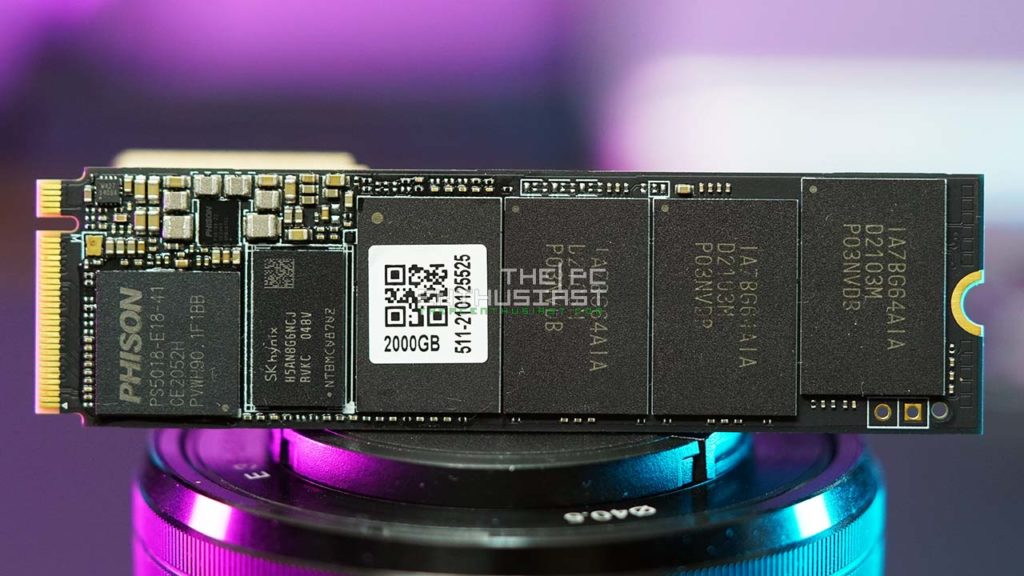
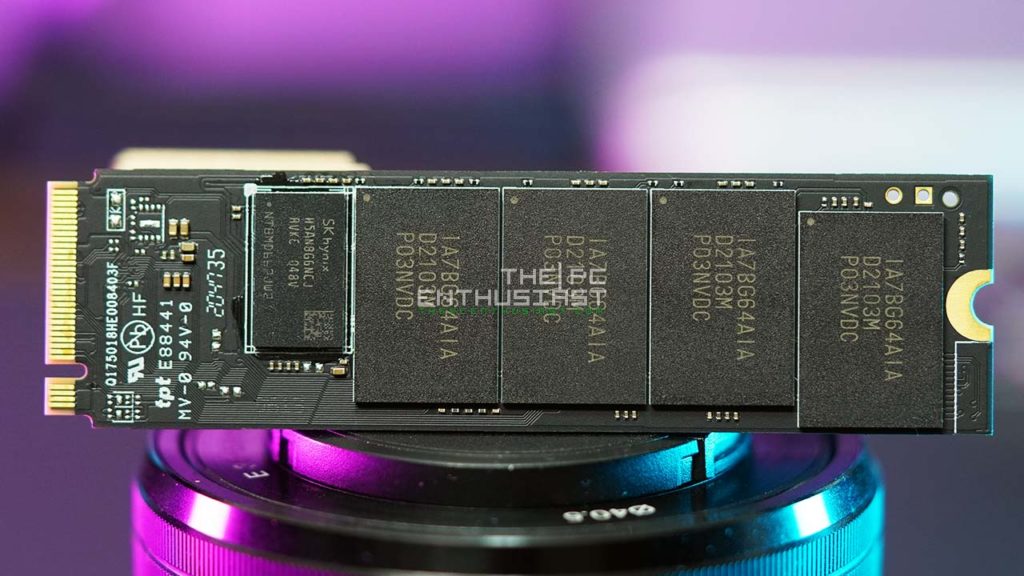
Above you can see the front and back sides of the Spatium M480 SSD. It is a double-sided SSD, meaning both sides of the drive’s PCB are populated. The layout and the design, including the components installed, are very similar to the Sabrent Rocket 4 Plus and AORUS Gen4 7000s SSDs we previously reviewed.
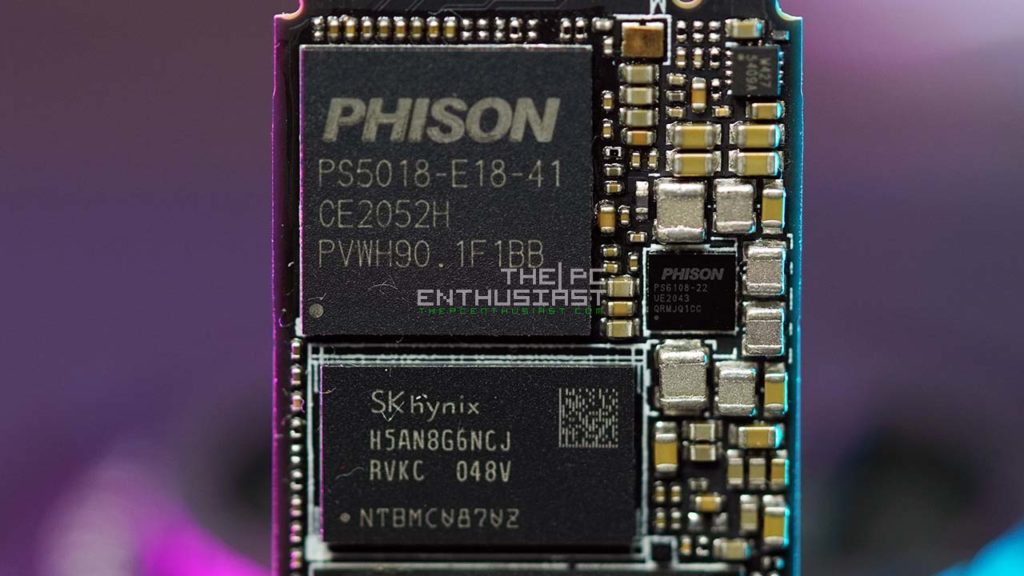
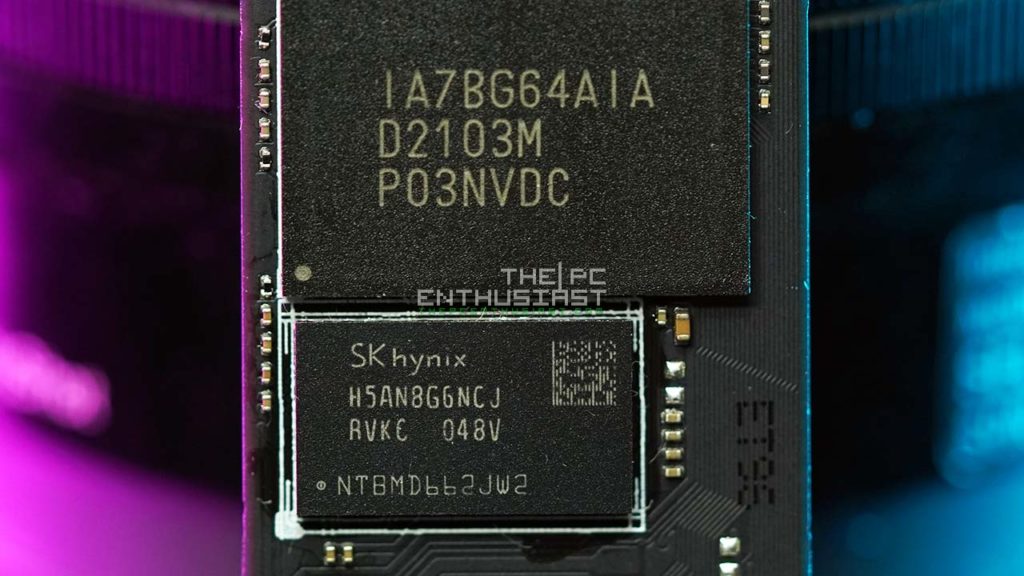
The first photo on the left-hand side is the Phison PS5018-E18 controller. Below is the SKhynix DDR4 DRAM, there are two DRAMs, one on each side. In the photo on the right-hand side, you can see Micron’s 96-Layer 3D NAND flash chip. There are eight NAND chips on this SSD, four on each side. Finally, you can see another SKhynix DRAM on the other side, for a total of 2GB DDR4.
Now let’s see how MSI’s new Spatium M480 SSD performs.
The Test Setup
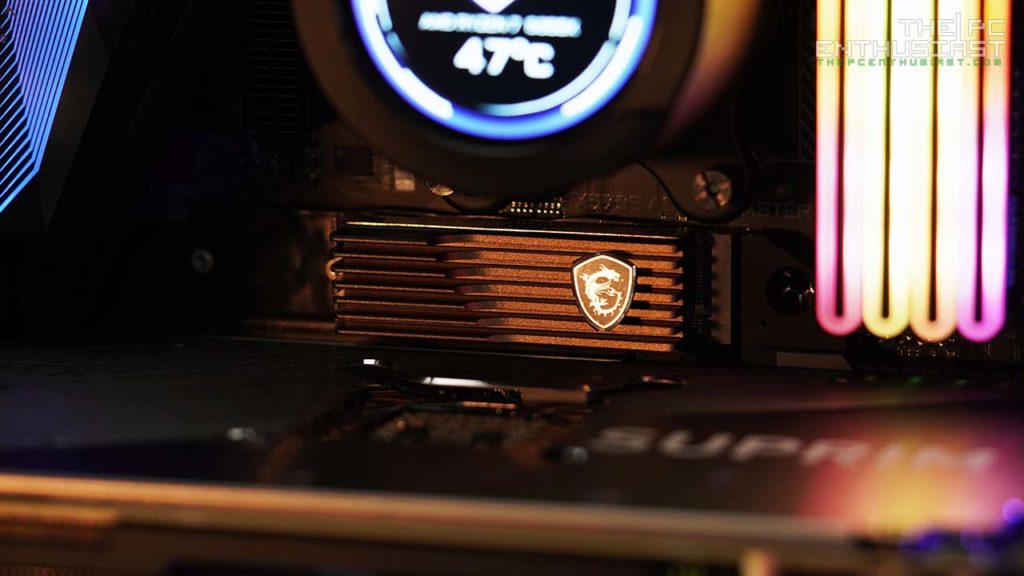
The MSI Spatium M480 is a PCIe 4.0 Gen4 SSD; meaning you’ll need a compatible system to take advantage of its speed. According to MSI, it is backward compatible with PCIe 3.0 but speeds will be significantly limited. Not all motherboards are built with PCIe 4.0 Gen4 capable M.2 slots. As of today, systems that support these types of SSDs are AMD’s X570 or B550 motherboards; powered by (at least) an AMD Ryzen 3000 CPU. Of course, the latest Ryzen Threadripper supports them as well. Intel’s Z590 motherboards paired with at least an 11th Gen Intel Core i5 CPU supports Gen4 SSDs too.
Again, you can install this on a PCIe 3.0 M.2 slot, but the speed will be limited to around 30Gbps (not recommended). It is also recommended to install the SSD on the slot close to the CPU. It’s usually the first M.2 slot right before the first PCIe x16 slot. Below are the rest of the specifications of the system I used to test MSI’s Spatium M480 2TB capacity.
| Operating System | Windows 10 Pro 64bit |
| Processor | AMD Ryzen 7 5800X |
| Motherboard | Gigabyte X570s Aorus Master |
| Memory | Klevv Cras XR RGB DDR4-4000 |
| Graphics Card | MSI GeForce RTX 3080 Ti SUPRIM X |
| OS Drive | Sabrent Rocket 4 Plus NVMe Gen4 SSD |
| Power Supply | SilverStone SX1000 Platinum SFX-L 1000W PSU |
| Chassis | Lian Li O11 Dynamic Mini |
MSI Spatium M480 2TB Benchmark Results
I tested the Spatium M480 with its heatsink installed. This is, after all, a review of the M480 with heatsink variant. I noticed that without a heatsink, the Gen4 SSDs tend to run hot and there is some throttling, especially during a prolonged test. So, if ever you plan on getting a Gen4 SSD that doesn’t come with a heatsink, be sure to utilize the motherboard’s heatsink for the M.2 drives, if available.
AJA Benchmark Results
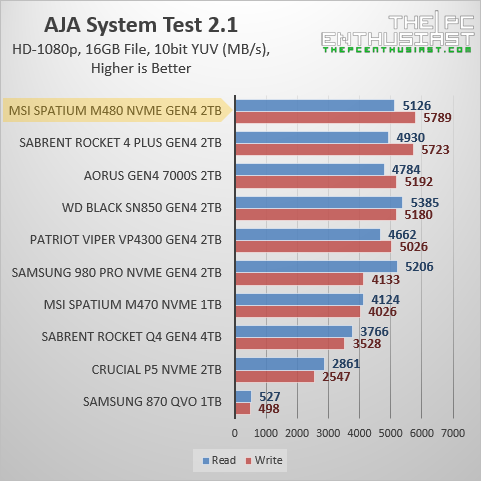
With the AJA System Test, the Spatium M480 performed slightly faster compared to Sabrent’s Rocket 4 Plus. The Aorus Gen4 7000s trails behind the two. It’s very interesting to see that despite having the same components and chips used, there is still a difference in the performance.
AS SSD Benchmark Results
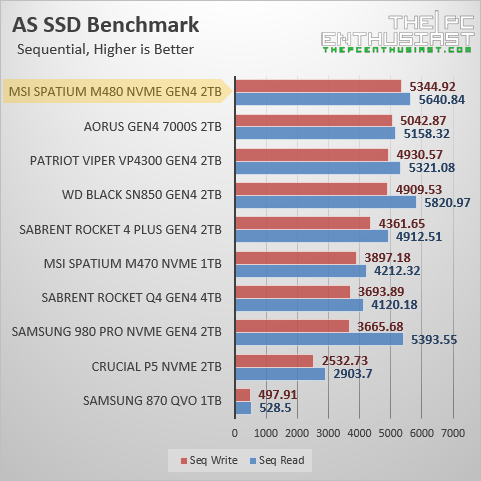
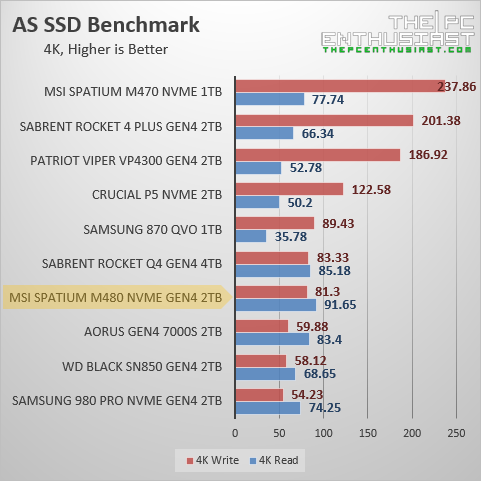
In the AS SSD sequential benchmark, the Spatium M480 is slightly faster than the Aorus Gen4 7000s. This time, the Rocket 4 Plus performed slower than expected. However, the M480 seems to be struggling with the random read and write tests. Its random read speed is faster than the other SSDs. However, its random write speed wasn’t that good; somewhat similar to the other Gen4 SSDs on the graph.
ATTO Disk Benchmark Results

ATTO Disk benchmark is a sequential test and we can see that the Spatium M480 was able to show off its performance in this test. The M480 didn’t exactly hit its advertised speed, but it was very close to hitting 7,000MB/s. I don’t expect that these drives would hit their advertised speeds because most of the time they don’t. And sometimes it also depends on the system used. But I do expect that they would at least get read/write speeds near or close to the advertised speeds.
CrystalDiskMark Benchmark Results
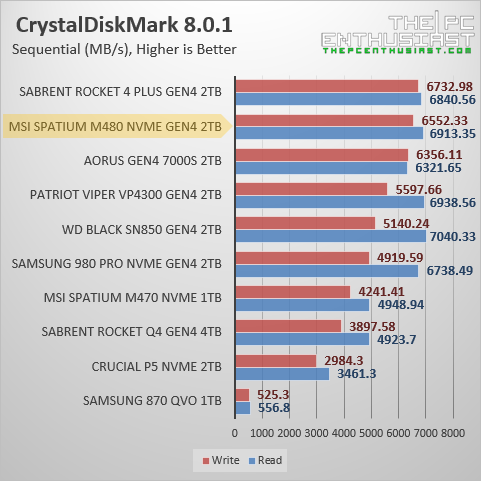
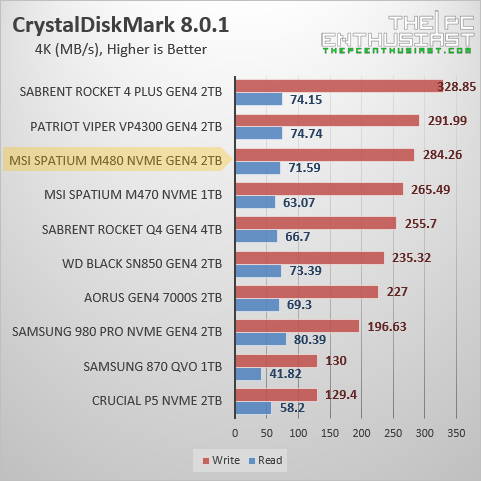
In CrystalDiskMark, the Rocket 4 Plus slightly outperformed the M480, with the Aorus Gen4 7000s just trailing slightly behind. During the 4K random test, the M480 performed well this time around. Although it did not end up at the top of the chart, its random read speed was amongst the highest, including its random write speed.
PCMark 10 Full System Drive Results
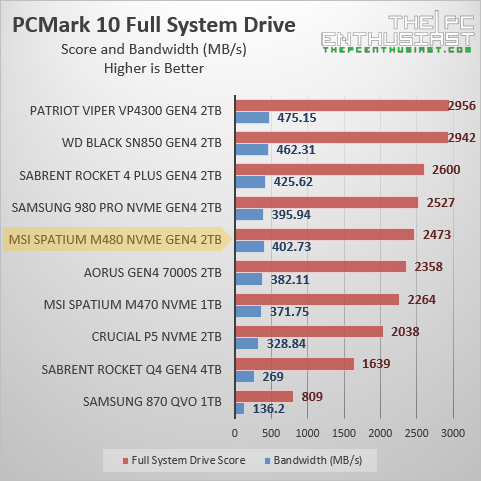
Finally, I tested the MSI’s Spatium M480 2TB Gen4 SSD using the PCMark 10 Full System drive benchmark suite. It is an intensive test and takes about an hour (or more) to finish. The test uses a wide-ranging set of real-world traces from popular applications (Adobe Creative Suite, Microsoft Office), and common tasks to fully test the performance of modern drives.
This is where the results got a little bit interesting. WD and Samsung are using an in-house controller and their own NAND flash chips. Meanwhile, the Spatium M480, Aorus Gen4 700s, and Rocket 4 Plus are basically made with the same components – Phison E18 and Micron’s NAND flash. Unexpectedly, Patriot Viper’s VP4300 powered with InnoGrit’s latest controller was on top of the chart.
I was really not expecting this result. While the VP4300 didn’t perform well on the previous benchmark tests, it was able to get a very good score in the Full System drive benchmark suite. A bit of a head-scratcher there. Although, the other Gen4 NVMe SSDs got different scores and overall bandwidth; at the end of the day, their performance difference is almost unnoticeable or perhaps even negligible in day-to-day use or gaming scenarios.
Pricing and Availability
The MSI Spatium M480 Gen4 NVMe M.2 SSDs are now available in 1TB and 2TB capacities in the US. It comes in with a heatsink and without heatsink variants as well. For the without heatsink, the 1TB capacity comes with a manufacturer’s suggested retail price of $219.99, while the 2TB capacity is priced at $434.99. For the with HS, the 1TB capacity comes with an MSRP of $229.99, and the 2TB capacity is $444.99. MSI is also offering a 5-year limited warranty for the said drives.
MSI Spatium M480 Gen4 NVMe SSD Review Conclusion
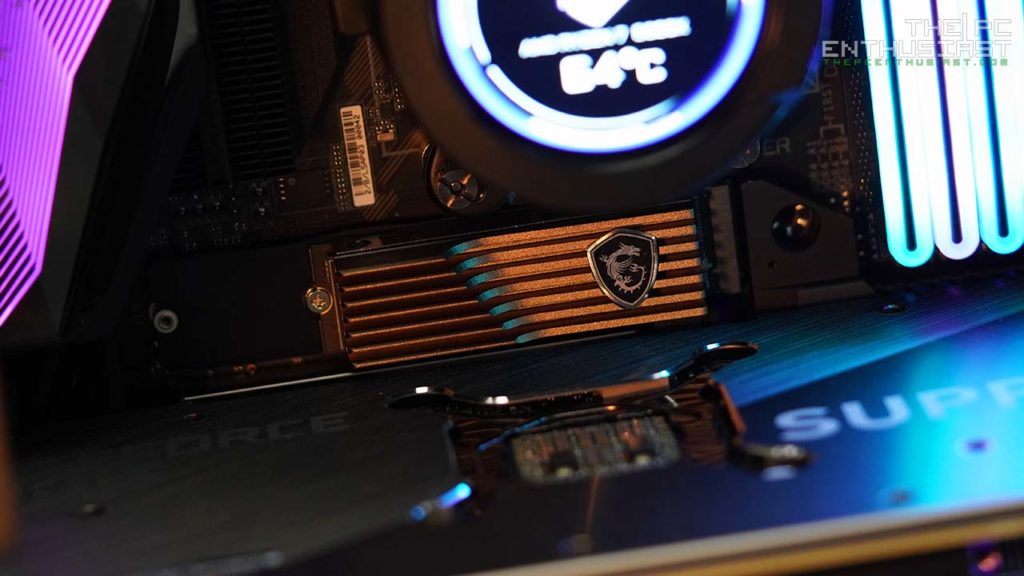
Just like the other Phison E-18 powered NVMe Gen4 SSDs, MSI’s Spatium M480 is fast! Its sequential read and write speeds were impressive and were able to perform near its advertised speed. In contrast, while the M480’s random read and write speeds were generally good, these E-18 controlled drives don’t have jaw-dropping 4K random read and write speeds. Don’t get me wrong, they are still substantially faster than hard disk drives and SATA-SSDs, but against other Gen4 drives, the performance varies.
When it comes to aesthetics, I like the design of its heatsink. Although it may not fall into everyone’s taste, it looks unique and stylish. However, if your motherboard’s M.2 slot already came with a heatsink for the SSD, you might as well get the without heatsink variant and save a bit of cash. On the other hand, if your motherboard doesn’t come with a heatsink for the M.2 SSD, it’s recommended that you get the with heatsink variant.
MSI’s Competition
The Gen4 SSD market was not as saturated compared to SATA and Gen3 SSDs before. But now, it is a different story. The market is becoming saturated and the competition is stiff. Almost all top PC hardware brands have their SSD lineup. I think Asus is the only one who doesn’t have an SSD yet. MSI is facing competition from the likes of WD, Samsung, Seagate, Sabrent, and even Corsair and Gigabyte. So, the price will be one of the major deciding factors for the consumer.
I did a quick check on the current retail prices of some of its competitors and it looks like the M480 is cheaper compared to Gigabyte’s Aorus Gen4 7000s. However, it is facing serious price competition against Samsung’s 980 Pro and Sabrent’s Rocket 4 Plus. Even WD’s SN850 and Seagate’s FireCuda 530 are (a bit) cheaper than MSI’s Spatium M480 lineup.
There is no question when it comes to the performance of the M480. Even its design passes with flying colors, at least for me. However, it will have to offer some discount or lower its price to compete with the other brands better. If MSI can do that, I think it will become more attractive to the consumers and it will have a better chance to stand out in the sea of SSDs.
Finally…
At the end of the day, MSI’s Spatium M480 PCIe 4.0 NVME SSD is an excellent and fast drive. It is powered by Phison’s E18 controller paired with Micron’s 96-layer NAND flash. It is also backed by a 5-year limited warranty or up to 1400TBW for the 2TB capacity. You simply can’t go wrong with this drive if the price is right.


